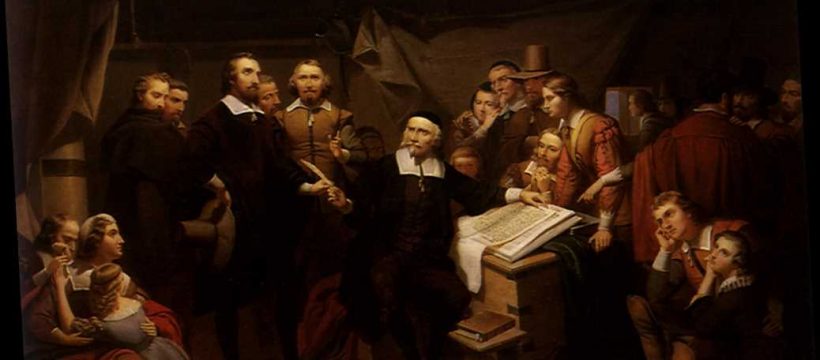In August 1619, a pirate ship, the White Lion, stopped at Jamestown and traded twenty-some captive Africans for food. The Africans were treated as indentured servants and soon released.
Fifteen months later, in November 1620, an English ship blown off course on its way to Virginia ended up off the barren coast of Massachusetts. It landed more than one hundred men, women and children. Those voyagers founded Plymouth Colony.
Which event mattered more?
Last year The New York Times declared that the arrival of the captives in Virginia was the “true beginning” of America — an America the Times characterized as a “slavocracy.” The Times calls its campaign to promote this story The 1619 Project. In my new book, “1620,” I argue that the arrival of the Pilgrims along with dozens of non-Pilgrims (“strangers” as the Pilgrims called them) aboard the Mayflower is the real beginning of America.
Why? Because before this mixed group stepped ashore they signed an agreement, which we now call the Mayflower Compact. In that document they set aside their deep divisions and voluntarily joined together to govern themselves with “just and equal laws.” This was the very beginning of principled self-government among European settlers in the New World. The Mayflower Compact is not quite 200 words long but those words pack almost as much meaning as Jefferson distilled into the Declaration of Independence 156 years later, or Lincoln in 1863 condensed into the Gettysburg Address.
The Mayflower Compact is a much humbler document than those two, but it has the advantage of being the first: the first time a mutually suspicious collection of settlers decided, without compulsion, to respect one another’s rights. Plymouth enacted its own laws, elected its own leaders, and after a winter of severe hardship, thrived as a peaceful self-governing community.
Meanwhile, Virginia was run by a private company in England which allowed the settlers some limited choices. Jamestown’s place in American history is secure, but it never became the model for American independence or a template for self-government.
Americans have so long cherished the story of the Pilgrims surviving in the wilderness with the help of Native Americans that we sometimes forget why this tiny colony was so important to our history. It is because they invented a prototype of our republic. The New England town became the very model of American self-reliance and ordered liberty. Plymouth also lived in peace with its neighbors, the Wampanoags, in a treaty that was unbroken for more than fifty years.
As pioneers of later generations carved new towns out of the wilderness, they looked back to Plymouth as the ideal of how to form a moral community based on equality. The signers of the Mayflower Compact were both Pilgrims and Strangers, young and old, prosperous and poor. Hierarchy was ignored. Masters and servants both signed. We can see this now in the seeds of the egalitarian America that would eventually shake off British rule and the yoke of Old Europe’s class system.
By contrast, the arrival of those pirates in Jamestown with their twice-stolen African captives laid no foundation at all. Slavery was already present in the Americas but it wouldn’t take root in the English colonies until more than half a century later.
The New York Times portrays slavery as starting in Jamestown in 1619 and spreading from there to become the bedrock of American society. That’s a false history, a myth.
The Pilgrims have also been mythologized from time to time, but the difference is the Mayflower Compact truly is the precursor to 1776, and Plymouth the archetype of American self-government.
Peter Wood is president of the National Association of Scholars. His book, “1620: A Critical Response to the 1619 Project” (Encounter Books), is out Nov. 17.
Share this article:
Source: Read Full Article



